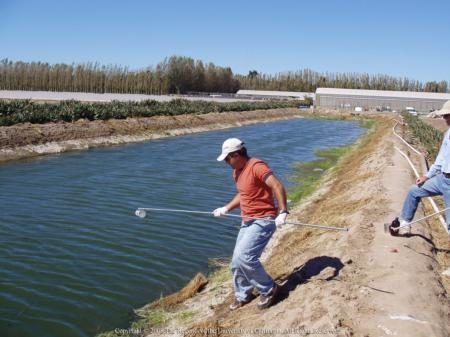Posts Tagged: groundwater
California's groundwater use during drought threatens future supply
“A significant number of regions in California won't have groundwater available in another generation or two if we continue business as usual.” -- UC scientists Thomas Harter and Helen Dahlke
In the special edition of California Agriculture released today (July 16), UC Cooperative Extension specialist and UC Davis professor Thomas Harter and UC Davis professor Helen Dahlke call attention to the stress being placed on California's aquifers as well as the catastrophic consequences of not having this hidden resource available in future droughts.
In the University of California's premiere journal for agricultural research, the groundwater experts make the following key recommendations:
- Groundwater is most effectively managed at the local or regional basin level, with support from the state.
- Local groundwater management entities must be given better tools, such as clear mandates to assess, measure, monitor and allocate their groundwater and control its extraction.
- The definition of groundwater sustainability can be set at the state level and translated into specific actionable thresholds that must be enforced locally, with a credible threat of state enforcement should the local efforts be unsuccessful.
- Much better data collection, analysis, reporting and data integration are needed to provide transparency, to support local management efforts and to properly inform the public. This requires much stronger planning and support within the DWR and SWB.
“Fundamentally, even more needs to be done," Harter and Dahlke write. "Local land-use decisions on urban and agricultural development, which have critical impacts on groundwater resources, must be consistent with groundwater management objectives. This will require significant communication between land-use and groundwater managers. Effective integration with water quality management and surface water management efforts, which are governed separately, is also required. And none of these efforts can occur without sustained funding through a mix of local and state sources.”
In their outlook article, Harter and Dahlke also explore one of the most promising ideas to protect our aquifers: groundwater banking.
The idea is that during storms or flood control releases, excess surface water could be directed from streams via existing water conveyance systems onto dormant or fallow agricultural fields, which would then serve as infiltration basins. Solutions need to be developed to add significant recharge to California's aquifers, often during relatively short periods when excess surface water is available.
A 3-year project, funded by UC Division of Agriculture and Natural Resources, aims to look at the feasibility of such groundwater recharge activities by setting up pilot groundwater recharge field experiments, which would provide valuable data to address concerns about the costs and risks to crops, the influence these projects may have on groundwater levels and flows, and the possibility of recharging contaminated water or degrading groundwater quality by leaching contaminants such as nitrate from the vadose zone. Data collected could serve as a foundation for developing economic incentives at the local, state or federal level to acknowledge the landowner's service to the local community and California's water supply reliability.
To read their entire article, "Out of sight but not out of mind: California refocuses on groundwater,” and the special "Water efficiency" edition of California Agriculture, visit http://californiaagriculture.ucanr.edu and http://ucanr.edu/repositoryfiles/cav6803p54-136027.pdf.
Further reading:
UC Cooperative Extension Groundwater Program http://groundwater.ucdavis.edu
Helen Dahlke's groundwater banking project http://dahlke.ucdavis.edu/research/groundwater-banking
California Water Action Plan: Improving Groundwater Management (links to state policy and emerging legislation) http://groundwater.ca.gov
California Department of Water Resources report to the Governor's Drought Task Force http://www.water.ca.gov/waterconditions/docs/Drought_Response-Groundwater_Basins_April30_Final_BC.pdf
California Water Plan Update 2013 http://www.waterplan.water.ca.gov/cwpu2013
Association of California Water Agencies Recommendations for Achieving Groundwater Sustainability http://www.acwa.com/sites/default/files/post/groundwater/2014/04/final_acwa-groundwater-sustainability-recommendations.pdf
Managing nitrogen on farm land focus of forums
Growers, dairy operators, agency representatives, agricultural commissioners, policymakers and other community members will gather for half-day forums in June to discuss management of agricultural nitrogen. The forums will be held in Sacramento on June 11 and in Tulare on June 18.
The two community forums to explore solutions to nitrate in groundwater and the role of policy are being hosted by the UC California Institute for Water Resources and the CDFA Fertilizer Research and Education Program.
The UC Davis report “Addressing Nitrate in California’s Drinking Water,” delivered in March to the State Water Resources Control Board, concluded that more than 90 percent of human-generated nitrate contamination of groundwater in the Tulare Lake Basin and the Monterey County portion of the Salinas Valley has come from agricultural activity.
Plants need nitrogen to grow, but nutrients that are not used by the crop may move below the root zone. Nitrate, a byproduct of nitrogen, may infiltrate to groundwater.
“The report found that farmers have already begun employing numerous techniques to reduce the amount of nitrogen fertilizer available in the soil,” said Doug Parker, director of the UC California Institute for Water Resources and leader for the UC Agriculture and Natural Resources water strategic initiative. “At the forums, we will be discussing how those efforts are proceeding and exploring additional solutions to protect groundwater quality. We’ll be asking the agricultural community what additional research and education they need from UC Agriculture and Natural Resources.”
At the forums, UC Cooperative Extension specialists will describe methods of managing nitrogen on dairies and cropland. Members of the agricultural industry and representatives of statewide and regional programs will discuss the practical aspects of adopting nitrogen management practices. To wrap up the sessions, Parker will present a case study on the effects of policy on nutrient management in the Chesapeake Bay region in the Northeast and lead a discussion of the role of policy in nitrogen management in California.
The June 11 forum will be held at the California Farm Bureau Federation in Sacramento from 10 a.m. to 3 p.m. The June 18 forum will be held at the UC Cooperative Extension office in Tulare from 1 p.m. to 5 p.m.
Both events are free and open to the public. To register or for more information about the events, please visit http://ucanr.edu/sites/managingagriculturalnitrogen.


